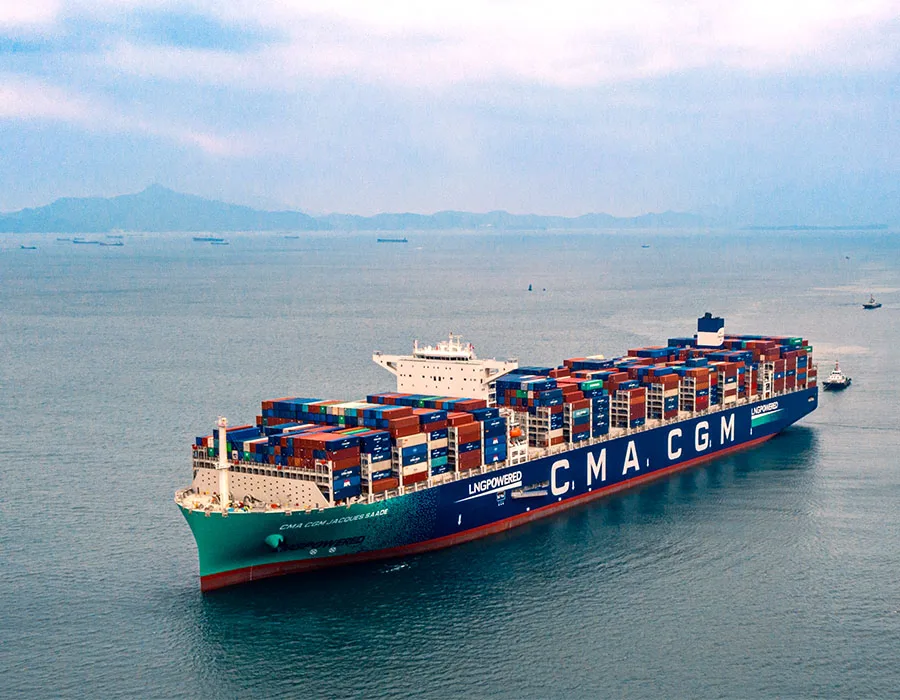Ship It Zero cautiously welcomes container shipping majors’ joint effort to end fossil fuel-powered ships, calls for more stringent plan to achieve 100% zero-emission shipping

The Ship It Zero coalition cautiously welcomes an announcement from five of the world’s largest shipping lines — MSC, Maersk, CMA CGM, Hapag-Lloyd and Wallenius Wilhelmsen — made in Dubai at COP28 that calls for an end date for fossil fuel-only powered newbuilds, while also urging the International Maritime Organization (IMO) to create the regulatory conditions to accelerate the green fuels transition. While the proposal contains some regulatory cornerstones that will accelerate the transition to zero-emissions shipping, Ship It Zero urges the IMO to apply a stringent climate regulatory lens to the industry proposal.
STATEMENTS FROM SHIP IT ZERO
“While we welcome the support of shipping majors for GHG pricing and well-to-wake emissions accounting, we urge the IMO to set strong targets for ending the use of fossil fuels by the sector, regardless of engine type. We also urge the IMO to opt for comprehensive vessel emissions accounting, reporting transparency, and rigorous enforcement. The climate crisis is a global emergency that requires clear-eyed, decisive action to decarbonize the shipping sector, not more industry smokescreens and weak regulations,” said Kendra Ulrich (she/her), Transportation Campaign Director, Stand.earth.
““The clock is ticking on the climate crisis and we don’t have time to waste with false solutions. We applaud these top shipping carriers for recognizing their power and responsibility to act in this moment. We commend the proposed actions to set greenhouse gas pricing and address well-to-wake emissions. But, now is the time for bold action that prioritizes transparency and equity, and we call on the IMO to set and enforce emissions rules that prioritize the rapid decarbonization of every vessel on a timeline commensurate with the climate emergency and carriers to meet those rules. It is clear. We must end our dependency on fossil-fueled shipping, including LNG, and move to 100% zero-emissions ships by 2030,” said Jonathan Butler (they/them), Ship It Zero Lead, Pacific Environment.
SHIPPING CARRIERS’ FOUR POLICY PILLARS AND SHIP IT ZERO RECOMMENDATIONS
Below are the carriers’ four agreed-upon policy pillars, as well as Ship It Zero’s corresponding recommendations:
An Effective GHG pricing mechanism
– Ship It Zero welcomes this proposal, and urges the IMO to adopt an aggressive GHG pricing framework to rapidly achieve market parity for green fuels.
An end date for fossil fuel-only vessels and a clear GHG Energy-Intensity Standard timeline
– Ship It Zero has significant concerns with regard to the narrowly defined “fossil fuel-only” vessels, as many LNG ships are dual-fuel vessels. Setting target end dates for fossil fuel usage would be a stronger standard – as the initiative stands, there would be no clear date when fossil fuel-powered ships would be phased out.
A vessel pooling option for GHG regulatory compliance
– Ship It Zero does not support this initiative as currently written, since the proposal lacks clarity on reporting transparency, additional details to ensure that compliance results in an equitable distribution of climate and pollution reduction benefits across geographies, and a proposed timeline for transitioning all vessels to operate with zero-emissions. Without further details, this proposal risks perpetuating environmental injustice due to inequitable emissions reductions and little, if any, enforcement.
A Well-to-Wake or lifecycle GHG regulatory basis to align investment decisions with climate interests
– Ship It Zero applauds these shipping carriers for taking a strong stance in support of well-to-wake emissions counting.
SHIPPING INDUSTRY’S POLLUTION PROBLEM
The global shipping industry accounts for 3% of global climate emissions, more than global air travel. If shipping were a country, it would be the world’s sixth-largest climate polluter. But since maritime shipping negotiated itself out of the U.N. Paris Agreement, the effort to reduce emissions in the industry has been slower than in other sectors.
Approximately 90% of the world trade is transported by sea, and current business-as-usual scenarios project emissions will grow up to 50% over 2018 levels. While the International Maritime Organization noted increased ship size and operational improvements aimed at creating better fuel efficiency have resulted in a decrease in emissions intensity, annual absolute emissions are still increasing.
Source: Ship It Zero

